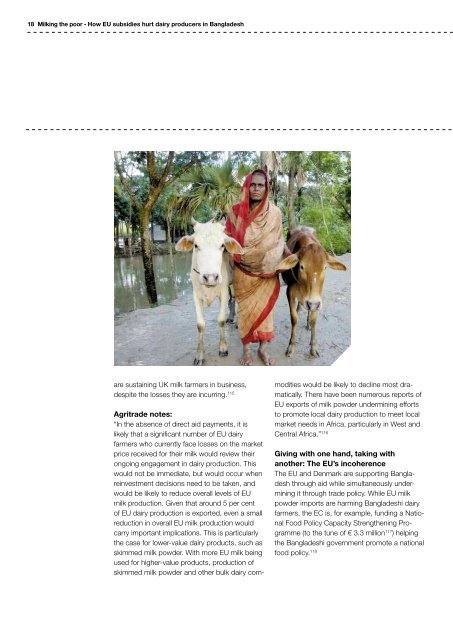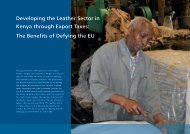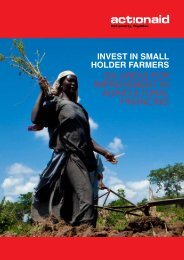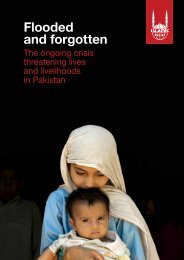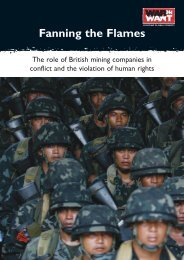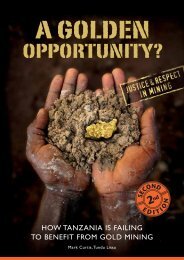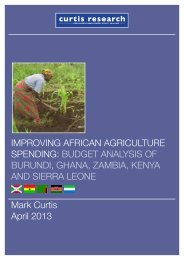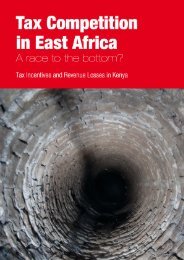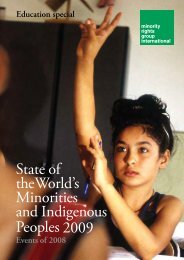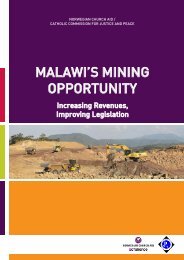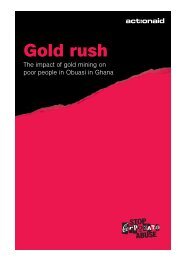Milking the poor - ActionAid International
Milking the poor - ActionAid International
Milking the poor - ActionAid International
You also want an ePaper? Increase the reach of your titles
YUMPU automatically turns print PDFs into web optimized ePapers that Google loves.
18 <strong>Milking</strong> <strong>the</strong> <strong>poor</strong> - How EU subsidies hurt dairy producers in Bangladesh 19 <strong>Milking</strong> <strong>the</strong> <strong>poor</strong> - How EU subsidies hurt dairy producers in Bangladeshare sustaining UK milk farmers in business,despite <strong>the</strong> losses <strong>the</strong>y are incurring. 115Agritrade notes:“In <strong>the</strong> absence of direct aid payments, it islikely that a significant number of EU dairyfarmers who currently face losses on <strong>the</strong> marketprice received for <strong>the</strong>ir milk would review <strong>the</strong>irongoing engagement in dairy production. Thiswould not be immediate, but would occur whenreinvestment decisions need to be taken, andwould be likely to reduce overall levels of EUmilk production. Given that around 5 per centof EU dairy production is exported, even a smallreduction in overall EU milk production wouldcarry important implications. This is particularly<strong>the</strong> case for lower-value dairy products, such asskimmed milk powder. With more EU milk beingused for higher-value products, production ofskimmed milk powder and o<strong>the</strong>r bulk dairy com-modities would be likely to decline most dramatically.There have been numerous reports ofEU exports of milk powder undermining effortsto promote local dairy production to meet localmarket needs in Africa, particularly in West andCentral Africa.” 116Giving with one hand, taking withano<strong>the</strong>r: The EU’s incoherenceThe EU and Denmark are supporting Bangladeshthrough aid while simultaneously underminingit through trade policy. While EU milkpowder imports are harming Bangladeshi dairyfarmers, <strong>the</strong> EC is, for example, funding a NationalFood Policy Capacity Streng<strong>the</strong>ning Programme(to <strong>the</strong> tune of € 3.3 million 117 ) helping<strong>the</strong> Bangladeshi government promote a nationalfood policy. 118Bangladesh is also one of <strong>the</strong> main recipientsof Danish development aid. In 2010, <strong>the</strong> Danish<strong>International</strong> Development Agency (DANIDA)spent DKK 471 million (€ 63 million) in Bangladesh.119 Agriculture is one of DANIDA’s priorityareas, and agricultural development is identifiedas essential for poverty reduction in Bangladesh.In <strong>the</strong> 1970s, DANIDA supported <strong>the</strong> establishmentof <strong>the</strong> Bangladesh Milk Producers Co-operativeUnion Limited (BMPCUL) which producesmilk under <strong>the</strong> trade name Milk Vita. 120DANIDA correctly notes that increasing agriculturalproduction and income improves foodsecurity, reduces vulnerability of farming householdsand reduces malnutrition and mortalityamongst children. 121 In 2004, before decouplingof subsidies, Carsten Staur, Chief of DANIDAstated: “It is clearly a problem that agriculturalsubsidies are contributing to maintain a productionin <strong>the</strong> world, which is not appropriate on <strong>the</strong>basis of an idea of <strong>the</strong> global division of labour.We are maintaining a production in Europe,which is not competitive.” 122EU milk powder imports also undermine aiddirected specifically to Bangladeshi milk powderproducers. It was announced in June 2011 that<strong>the</strong> <strong>International</strong> Finance Corporation (IFC), <strong>the</strong>private sector lending arm of <strong>the</strong> World Bank, isproviding a € 5.3 million loan to PRAN Group –<strong>the</strong> largest food processing company in Bangladesh- to expand its local dairy procurement andprocessing capacity.The IFC says this will help increase <strong>the</strong> incomesof about 17,000 Bangladeshi dairy farmers andcontribute to <strong>the</strong> country’s food security. It alsonotes that “Bangladesh has one of <strong>the</strong> lowestper capita milk consumption levels in <strong>the</strong> worldand imports milk powder to meet 15 per centof its dairy demand”. IFC’s investment will helpPRAN raise processing capacity across itsproduct range, including ultra-heat-treated milk,pasteurised milk, and milk powder, and increaseraw milk procurement from local dairy farmers.“PRAN’s expansion will help increase <strong>the</strong> localsupply of value-added dairy products, contributingto food security in Bangladesh,” said an IFCspokesperson. 123In <strong>the</strong> 2005 “European Consensus on Development”,<strong>the</strong> issue of Policy Coherence forDevelopment was identified by <strong>the</strong> EU as apioneering concept for achieving <strong>the</strong> MillenniumDevelopment Goals. The EU has committeditself to ensuring that its various policies do notundermine social and economic progress indeveloping countries. Article 208 of <strong>the</strong> 2009Lisbon Treaty states that: “Union developmentcooperation policy shall have as its primaryobjective <strong>the</strong> reduction and, in <strong>the</strong> long term, <strong>the</strong>eradication of poverty. The union shall take accountof <strong>the</strong> objectives of development cooperationin <strong>the</strong> policies that it implements which arelikely to affect developing countries.”In <strong>the</strong> spring of 2010, <strong>the</strong> EC conducted apublic hearing online, and in <strong>the</strong> Commission’ssummary, it states: “The EU should avoiddamaging <strong>the</strong> economies or food productioncapacities of developing countries.” 124 However,in <strong>the</strong> Commission’s communication on <strong>the</strong> CAPpost-2013, published in November 2010, noreference is made to <strong>the</strong> effect of <strong>the</strong> CAP ondeveloping countries, except in <strong>the</strong> context offood security, where it is stated that EU agricultureshould contribute to world food demand bymaintaining and improving production capacity,while respecting EU commitments in internationaltrade and Policy Coherence for Development.125 As this report shows, it is precisely<strong>the</strong> high production level that has a damagingeffect on agricultural development in developingcountries.


